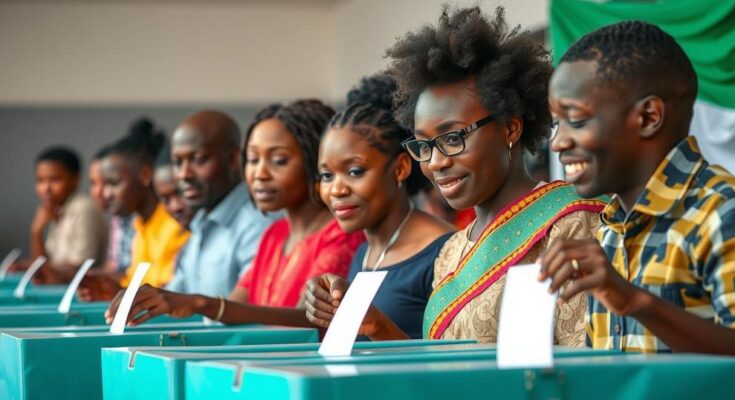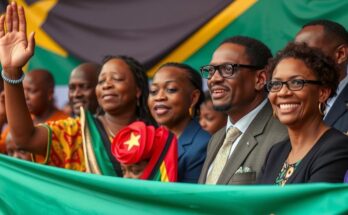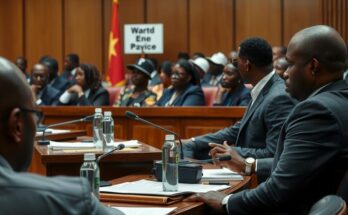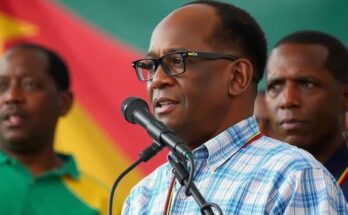Ghana’s recent presidential and parliamentary elections saw Vice President Mahamudu Bawumia and former President John Mahama as principal contenders. The elections were driven by public discontent over an unstable economy marred by high inflation and debt crises. Voter engagement reflects a desire for urgent economic reforms. Early results are anticipated, with potential implications for the country’s stability and economic direction.
On Saturday, Ghana held presidential and parliamentary elections, with Vice President Mahamudu Bawumia and former President John Mahama emerging as the principal candidates in a fiercely contested race. The elections are somewhat hopeful, as they come in the aftermath of Ghana’s most severe economic crisis, marked by high inflation and a significant debt default. President Nana Akufo-Addo, completing his second term, will step down next month, prompting a shift in the political landscape amidst widespread calls for economic reform.
Voting concluded at 1700 GMT, with preliminary results anticipated to be available on Sunday, while complete results for the presidential election are expected by Tuesday. The struggling economy, characterized by soaring inflation and job scarcity, has become the focal point for Ghanaians, as many express discontent over living costs. Retired policeman James Nsiah remarked, “We want to vote for change, the economic situation is very hard” as he awaited to cast his vote in Accra, underscoring the electorate’s urgent desire for improvement.
Both main parties—the ruling New Patriotic Party (NPP) and the opposition National Democratic Congress (NDC)—have alternated leadership in Ghana since 1992. The NPP hopes to maintain its hold on power through Bawumia, despite his struggles with associations to President Akufo-Addo’s contentious economic policies. Bawumia, a trained economist, remains optimistic about victory, advocating for initiatives aimed at economic recovery, including Digitalisation, education, and health programs.
The opposition candidate, Mahama, previously led the nation from 2012 to 2017 and is seeking to regain leadership. He advocates for reforms to establish a “24-hour economy” to stimulate job growth and says he will renegotiate aspects of the IMF agreement. Nevertheless, he confronts skepticism from voters recalling his administration’s economic challenges, such as power shortages.
As a notable election issue, illegal gold mining comes into play, affecting both the economy and local ecosystems. While promises to combat this activity have been made, harmful practices have continued, causing environmental degradation and economic instability—factors pivotal to voter concerns. Abdullah Mohammed, a first-time voter and visual arts student, expressed indifference towards the candidates, saying, “I just want a good president who will bring changes. I don’t really care if it is Bawumia or Mahama.”
Ultimately, the election outcome could signal a crucial turning point for Ghana as it seeks economic stabilization and leadership capable of addressing pressing issues like inflation, job scarcity, and environmental concerns. The dynamic between the candidates, along with the electorate’s demands for an effective economic vision, will shape Ghana’s political path in the coming years.
Ghana is a significant player in West African politics, boasting a history of democratic governance since the early 1990s when multi-party elections were reintroduced. The country is recognized as the second-largest producer of cocoa globally and a substantial gold exporter. Ghana’s economic landscape has recently been challenged by a severe financial crisis, manifesting as a debt default and rampant inflation that reached over fifty percent. In response to these alarming economic conditions, the government has sought assistance from the International Monetary Fund (IMF), leading to ongoing negotiations for a bailout of $3 billion. As Ghana approaches its elections, voters are acutely aware of the need for economic rejuvenation, with citizens eagerly expressing their desire for transformative leadership regardless of party affiliation.
The recent elections in Ghana mark a critical juncture for the nation as two leading candidates vie for control amidst urgent calls for economic reform. With a beleaguered economy and contentious political history, Ghanaians are keenly focused on finding a leader capable of enacting meaningful change to alleviate their struggles. As the votes are counted and results are expected soon, the implications of this election will resonate deeply within Ghana’s social and economic frameworks for years to come.
Original Source: www.france24.com




